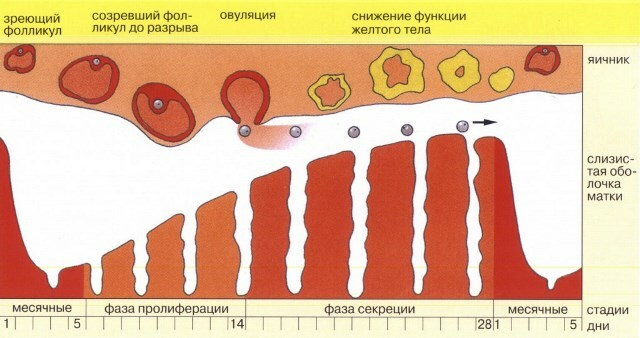The female body is at times unpredictable, and most of the problems are related to the function of the reproductive system. But still her work has some regularities. Therefore, when the lower abdomen hurts, and spotting is noticed not in time, the reason for this should be clarified by a specialist. They are not always healthy.
When you can not be afraid of excretions
Allocations with blood from the genital tracts are also natural. After all, they come from the uterus, which has a regularly replaced inner layer filled with blood vessels. The body itself has the ability to contractions, leading to pain. In connection with these patterns, discomfort in the abdomen and discharge with blood can be detected for the following reasons:
- The onset of menstruation. Not always critical days come in accordance with the schedule. Sometimes they hurry up because of a minor hormonal failure, forced acclimatization, severe fatigue, increased physical activity. If the spasms can not be called intense, the volume of secretions increases gradually, they have a uniform consistency, a red or brownish color - this corresponds to how the monthly ones go. It is important to pay attention to the accompanying signs of PMS, including: drowsiness or excitement, increased appetite, increased skin and hair greasiness.
- Ovulation. The output of the egg does not at all and not in every cycle occurs with the release of blood, but this happens. It is about several spots and weak, short pain, since several follicles can be damaged if the follicle is ruptured.
- Pregnancy. Everyone is sure that, on the contrary, it means the absence of secretions, especially with blood. But in the early stage of pregnancy, when a fetal egg is screwed into the wall of the uterus, damage to the endometrium occurs. At the same time, vascular ruptures are unavoidable, so that small discharges lasting about 48 hours, and weak aching pain can occur.
- Postpartum period. This is a transitional time, in which changes in the composition of the sex hormones and the restoration of the functions of the reproductive organs. The process is marked by blood secretions, initially intense, but tending to gradually decrease. They are observed up to 1.5 months.
- Intervention on the uterus. After abortion or curettage, its internal walls are a wound surface. While she is healing, for 7-10 days there may be small discharge with blood, there is a slight pain.
- Taking medication. Hormonal drugs, as well as contraceptive methods, force the reproductive organs to change their functioning characteristics. Adaptation does not occur immediately, but until it lasts( up to 3 months), the separation between monthly is acceptable.

Normal menstrual cycle in women
Discharge with blood as a symptom of the disease
Lower abdominal pain and spotting can be manifestations of diseases of the reproductive organs. At first, menstruation changes, it concerns both its parameters and the schedule. Allocations with abdominal pain are also worrisome outside the period of critical days, if the following pathologies exist:
- Ectopia of the cervix. Since this pathology affects the epithelium of the organ, the cells of which are easily separated, then the plague is seen after an intimate contact. There may be minor pain.
- Endometritis. The disease begins when inflammation occurs in the uterine mucosa. In its acute course, there are other manifestations: temperature, severe abdominal pain, nausea. With chronic endometritis, excretions outside the menstrual period may be the only sign. The second is a recurring pain that will coincide with bloody smears or will disturb without it.
- Endometrial hyperplasia. Abnormal thickening of the inner shell of the uterus deprives the body of the uniformity of development. Therefore bloody troubles worry for a few days before the critical. The further the pathology entered, the more likely their appearance in the middle of the cycle.
- Polyps. Their formation is provoked by the same disorders that hyperplasia. Thick areas of the mucosa cause pain, easily part with their particles. Therefore, discharge with blood reveals a presence not only after sexual contact or lifting of the heaviness, but also when the tissues become too much. The daub with the polyp appears immediately before the menstruation and completes it.
- Endometriosis. When the disease cells of the mucous membrane of the uterus take root in its deeper layers or outside the internal space of the organ. Their ability to obey the influence of hormones leads to abdominal pain, especially in the middle of the cycle, when these tissues acquire the greatest thickness. Under the weight of their own weight, they can exfoliate, which provokes discharge with blood at any time interval of the cycle.
- Myoma of the uterus. The tumor has many vessels in it. It develops under the influence of hormonal disorder, therefore it provokes not only an increase in the number of secretions during menstruation, but also bleeding between them. Pain in the abdomen is a frequent companion of myomas, and it intensifies as a result of physical activity, after sex. In most cases, unpleasant sensations and bleeding coincide.
- Ovarian cyst. If the lower abdomen pulls, spotting is seen outside the menstrual period, and they themselves shift, force to change pads more often, this may indicate a pathology in one of the sex glands. Bleeding can be weak or intense, and pain intensifies during sex.
- Venereal diseases. The pathological process in the reproductive organs leads to the appearance of an ointment from the genital tract, as well as pain in the lower abdomen, possibly itching in the vagina and perineum. Discharges can get a sharp smell.
- Ectopic pregnancy. Fixation of the fetal egg outside the organ leads to damage to those parts of the body where it was implanted. As the embryo grows, and the fallopian tube or cervix is not adapted to its presence, their tissues are injured, the vessels are destroyed. This causes growing pain and the appearance of brown precipitates.
- Endometrial cancer. Pathology at an early stage can manifest itself with extra-menstrual bleeding or minor brownish discharge. Pain is detected later, when the tumor affects the nerve roots. Endometrial cancer is mostly formed in those who previously had benign tumors of the reproductive organs. Therefore, they, as well as women in menopause, should be very careful about these symptoms.
- Hormonal imbalance. This is not only a violation of the ratio of estrogens and gestagens, but also disorders of the endocrine glands. The first can be age-related, when a girl turns into a teenager, or seen in a woman in premenopausal. At a young age, it is necessary to be treated, if the spotting is not detected in time over 2 years. In pre-menopause, with such symptoms, control over the reproductive organs should be more thorough, since from a simple hormonal failure close to a serious illness.

How to understand that you need a doctor
If you try to establish yourself whether it's worth worrying about blood liberation, you should always pay attention not only to the timing of their appearance. Other characteristics are important:
- intensity,
- color,
- duration,
- consistency.
Obviously, with ovulation and pregnancy there can be no intensive secretion, and even with monthly in their volumes there are clear limits.
Approximately the same criteria should be used to assess pain. If its occurrence coincides with the critical days, but the sensations are intolerable, they are not eliminated by conventional antispasmodics, you should not try to persuade yourself that this is a monthly one. The specialist should go when:
- both symptoms are too pronounced;
- both signs do not greatly change the state of health, but they do not repeat in one cycle.
If the stomach hurts, and spotting does not give the chance most to reveal their nature, before visit to the gynecologist it is not necessary to "wind" itself. Even if it is a disease, most of the disturbing signs of pathologies are successfully treated.

 We recommend reading the article on the causes of bloody discharge between menstruation. From it you will learn about whether such discharge can be the norm, about the diseases that cause such a symptom, the manifestations of endometriosis, endometritis, myoma and polyps of the uterus, ectopic pregnancy.
We recommend reading the article on the causes of bloody discharge between menstruation. From it you will learn about whether such discharge can be the norm, about the diseases that cause such a symptom, the manifestations of endometriosis, endometritis, myoma and polyps of the uterus, ectopic pregnancy.